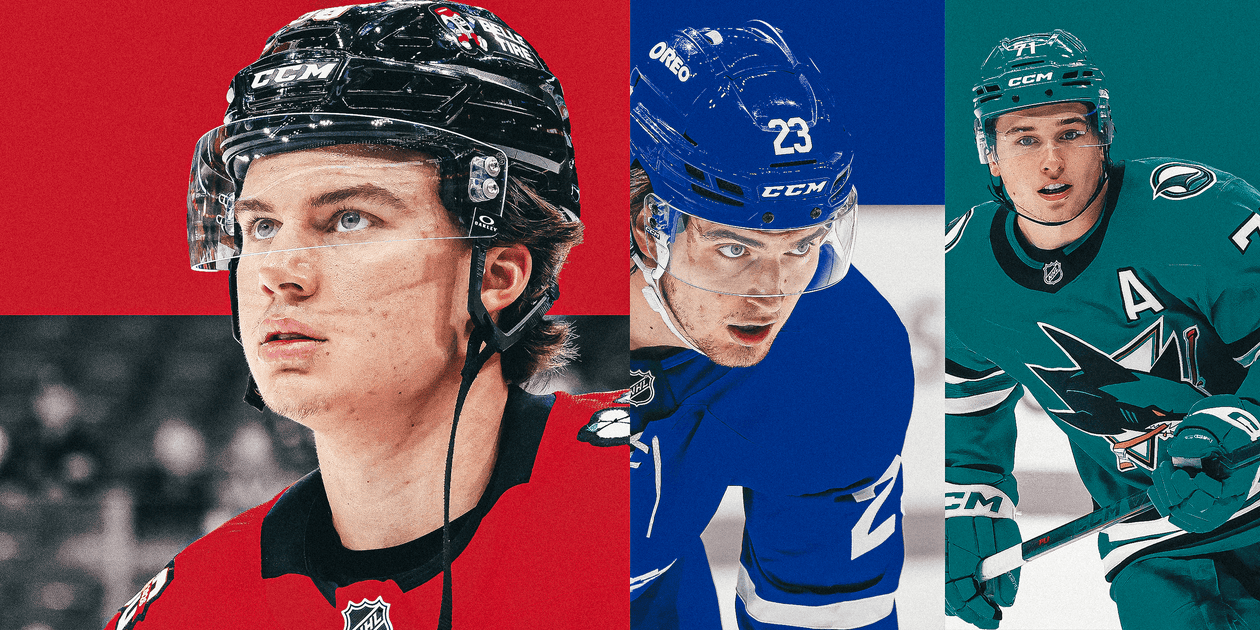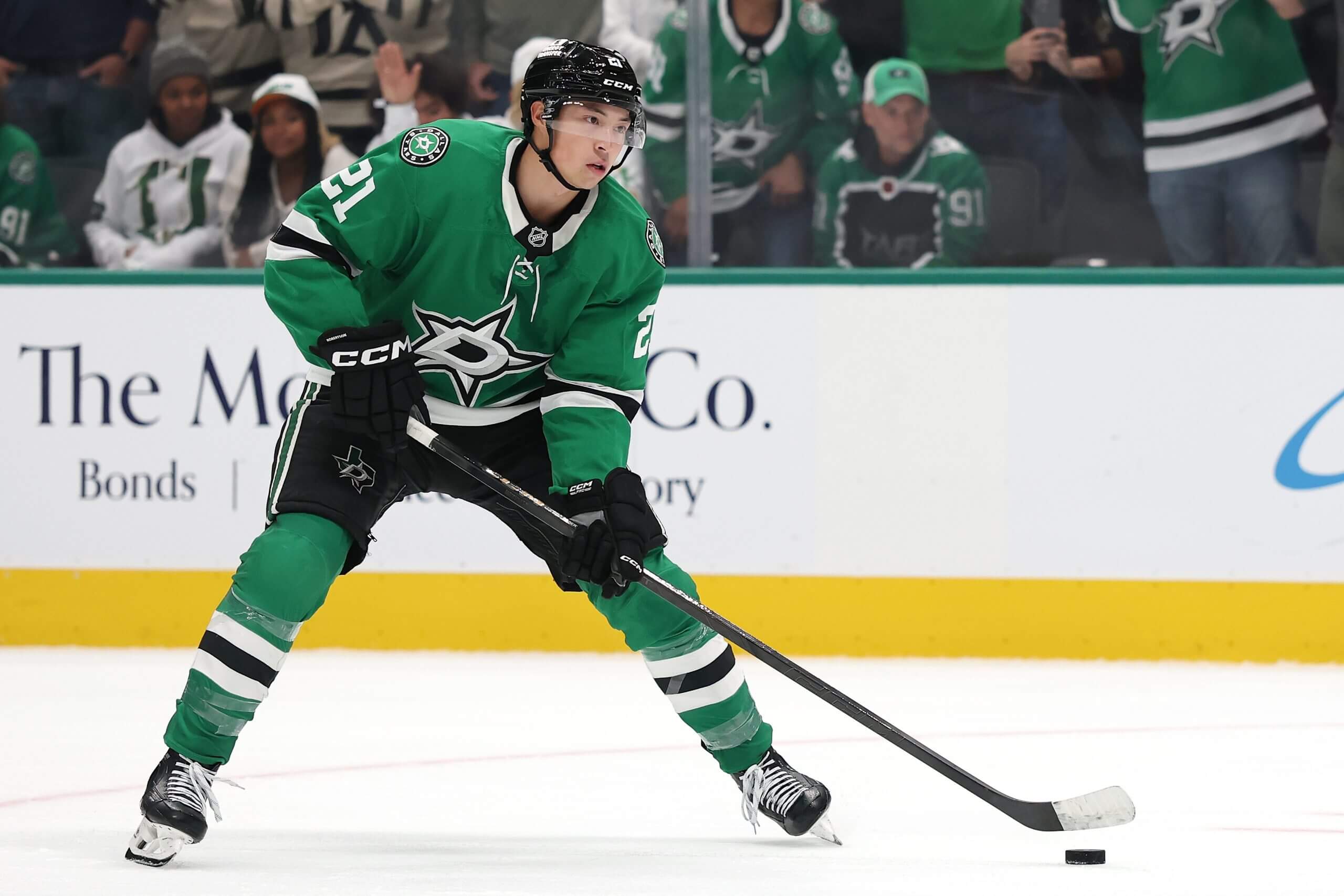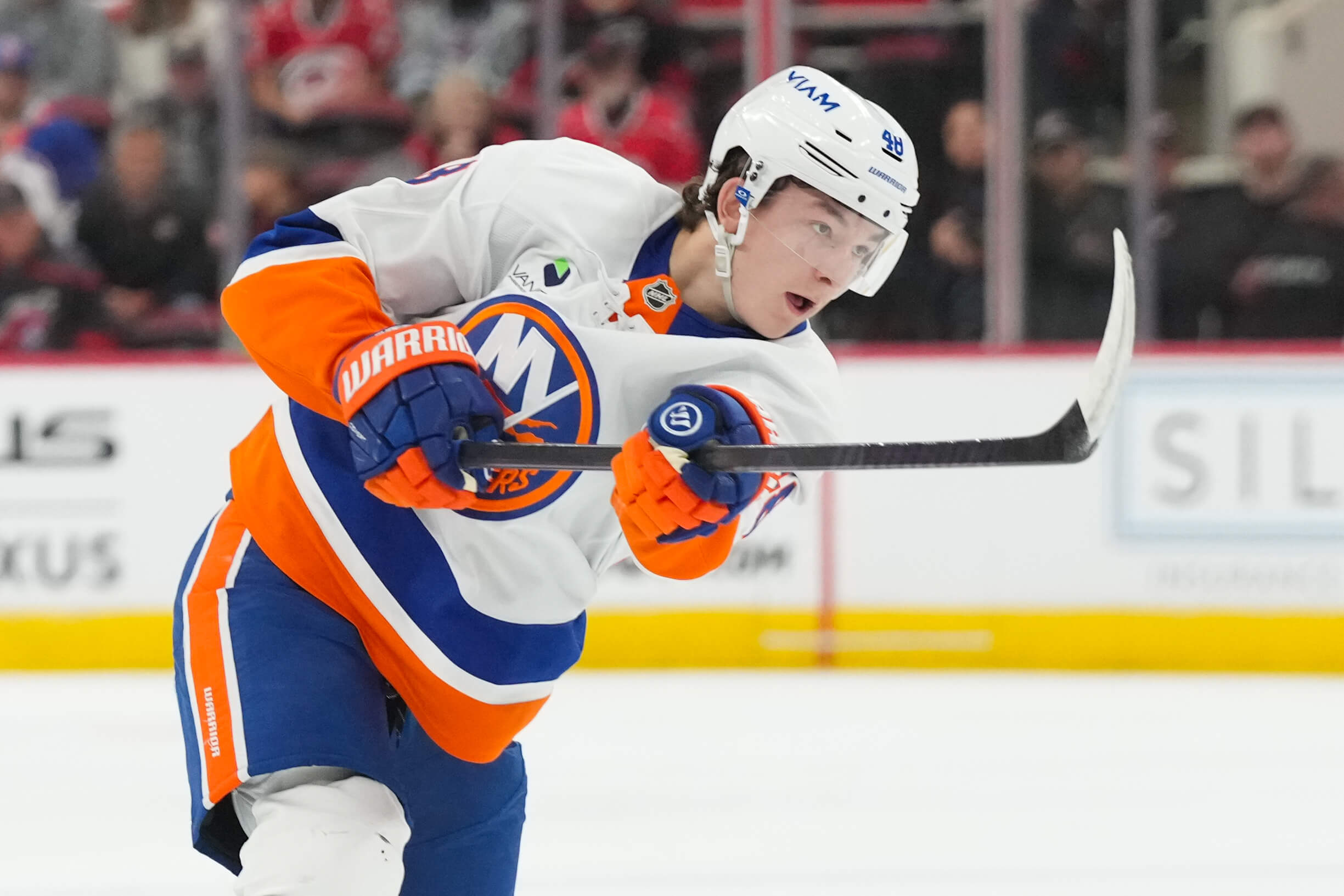There are only 88 days until the puck drops for men’s hockey at the 2026 Milan-Cortina Olympics, and the clock is ticking for teams to finalize their rosters ahead of the Dec. 31 deadline.
With some NHLers already officially on teams, and other roster spots seemingly starting to be finalized behind the scenes, which players are making their cases to crack an Olympic roster with their early performances this season?
The Athletic asked its NHL staff for one from each team. Here’s what they said.
Anaheim Ducks
Leo Carlsson, Team Sweden
Carlsson wasn’t on Sweden’s initial list of six, but now the bigger question is whether he’ll be the No. 1 center for Tre Kronor. The 20-year-old just had his 11-game point streak end, but he’s gone without a point only three times in his first 17 games and was tied for third in the NHL in scoring as of Friday. He’s becoming a star, and the best-on-best Olympics will be a massive stage. Cutter Gauthier could be playing into Team USA consideration after his blazing start. — Eric Stephens
Boston Bruins
Morgan Geekie, Team Canada
Geekie has not been on Canada’s radar. There are so many Canadian forwards deserving of spots. But since Jan. 1, Geekie has scored 36 goals. Only David Pastrnak (40) has more among NHL forwards. The native of Strathclair, Manitoba, is a late bloomer. But if Canada wants goal scorers, no Canadian has more than Geekie in 2025. — Fluto Shinzawa
Buffalo Sabres
Tage Thompson, Team USA
Rasmus Dahlin has already been named to Team Sweden. Of the rest of the Sabres, Thompson probably has the best shot at making a team. He played for Team USA at the World Championship and scored the game-winning goal in the gold medal game. He has 14 points in 17 games to start the season, but he’s struggled defensively and hasn’t been consistent. He’s not a lock for Team USA, but he still has a shot to make a push for a spot. — Matthew Fairburn
Calgary Flames
Nazem Kadri, Team Canada
Kadri would need an incredible season to move the needle for Team Canada. But he’s a veteran presence who leads his team in scoring, and he just had his best season goals-wise at the age of 34 last year. If nothing else, it’d be a fun story for the Stanley Cup champion who recently played his 1,000th game and called his shot to make the Canadian Olympic team in August. — Julian McKenzie
Carolina Hurricanes
Seth Jarvis, Team Canada
Jarvis was the surprise pick by Canada for last year’s 4 Nations Face-Off, but that doesn’t make him a lock for Milan-Cortina. With young players such as Macklin Celebrini and Connor Bedard making a push for the team, Jarvis will still need to prove he should be wearing the Maple Leaf in February. He’s doing that so far, scoring at over a 50-goal pace and contributing as an all-situations mainstay for a Stanley Cup contender. — Cory Lavalette
Chicago Blackhawks
Connor Bedard, Team Canada
It was pretty clear Bedard needed a hot start if he had any chance of making Team Canada’s Olympic team. He has certainly done that. He’s scoring more goals. He’s creating more for his linemates. He’s playing better defense. He’s even winning more faceoffs. Aside from putting together a larger sample, there isn’t much more he can do to state his case. — Scott Powers
Colorado Avalanche
Mackenzie Blackwood, Team Canada
I’m not sure Blackwood perfectly fits the category of “making a case” to crack an Olympic roster, because he missed the first month of the season after undergoing offseason surgery. But with Jordan Binnington, Adin Hill and Sam Montembeault all off to poor starts, he could easily force his way onto Team Canada’s roster. Gabriel Landeskog was also an option here, as he could end up playing for Sweden, but he hasn’t exactly “made a case” either, with only 6 points in 18 games. — Jesse Granger
Columbus Blue Jackets
Zach Werenski, Team USA
Werenski was a monumental player for Team USA at the 4 Nations, further cementing his status as one of the red, white and blue’s pre-eminent international players. Along with Charlie McAvoy and the Hughes brothers, Werenski gives the Americans an incredibly talented blue line. His bona fides as a player who wants to play for his country are well established: Beyond 4 Nations, Werenski has played in three World Championships, two World Juniors and one World U17 Hockey Challenge. — Aaron Portzline
If the Americans are willing to move on from older vets such as Vincent Trocheck and Brock Nelson, Jason Robertson has a strong case as one of the more consistent producers in the league. (Stacy Revere / Getty Images)
Dallas Stars
Jason Robertson, Team USA
There are plenty of locks on the Dallas roster, including Thomas Harley after his 4 Nations fill-in performance in February. But Robertson has a compelling case. If the Americans are willing to move on from older vets such as Vincent Trocheck and Brock Nelson, Robertson has a strong case as one of the more consistent producers in the league, with 109, 80 and 80 points over the last three seasons. He has size, durability (hasn’t missed a game in more than three seasons) and big-game experience. — Mark Lazerus
Detroit Red Wings
Dylan Larkin, Team USA
Frankly, Larkin’s spot on Team USA was already all but assured after his outstanding performance at the 4 Nations, but his start to this season can only have cemented it. He’s been one of the top scorers in the league, with 10 goals and 21 points through 17 games, and has done it while taking on tough matchups. The latter is more important to the way he’ll be used on Team USA, and his shutdown effort against Connor McDavid earlier this season showed why. — Max Bultman
Edmonton Oilers
David Tomasek, Team Czechia
Connor McDavid and Leon Draisaitl have already been named to their countries’ teams. Struggles from Evan Bouchard and Mattias Ekholm leave them with an uphill climb to crack crowded Canadian and Swedish blue lines. Stuart Skinner, Zach Hyman and Ryan Nugent-Hopkins are long shots to make Canada’s roster for various reasons. That really leaves only Tomasek, a 29-year-old NHL rookie. Tomasek was a member of Czechia’s World Championship win on home ice in 2024. — Daniel Nugent-Bowman
Florida Panthers
Brad Marchand, Team Canada
If there was ever any doubt about putting the 37-year-old back on Team Canada, Marchand has shattered that with his phenomenal start. With another 2 points Thursday, he has 20 in 16 games, putting him into a tie for 20th in NHL scoring with Sidney Crosby and Leon Draisaitl. Only three Canadians have scored more goals than Marchand’s 11 so far this season, and his star turn during last year’s Stanley Cup run was nearly Conn Smythe worthy. He’s on the team. — James Mirtle
Los Angeles Kings
Drew Doughty, Team Canada
With Adrian Kempe (Sweden) and Kevin Fiala (Switzerland) already named to those initial rosters, the focus turns to Doughty and playing in his third Olympics at age 35. He’s healthy after battling back from last season’s ankle fracture and looking to make the team in a defense-focused shutdown role. Doughty isn’t the only one, as Darcy Kuemper’s consistent play this season has put him into Canada’s goaltending mix. — Eric Stephens
Minnesota Wild
Matt Boldy, Team USA
When Boldy made the 4 Nations roster, many accused Wild GM Bill Guerin, who doubles as Team USA’s GM, of nepotism. But the 24-year-old star-in-the-making had a solid tournament and is following it up with a strong start to this campaign, with nine goals and 18 points in 18 games. On a U.S. roster pool filled with quality wingers and stiff competition, Boldy is making the case as a no-brainer selection. — Michael Russo
Montreal Canadiens
Nick Suzuki, Team Canada
Team Canada general manager Doug Armstrong was at the Bell Centre twice in a span of a week. He surely had others to look at, but Suzuki was high on his watch list. Before games Thursday, Suzuki had 57 points in 43 games since the return from last season’s 4 Nations, a tournament he was not selected for. That was third in the NHL, 3 points ahead of Connor McDavid. He can play center and wing, on the power play and the penalty kill. He has made it impossible for Armstrong not to take him. — Arpon Basu
Nashville Predators
Filip Forsberg, Team Sweden
This should be a formality, right? But unlike with teammates Roman Josi and Juuse Saros — Switzerland and Finland — Forsberg has not been officially named to the team. He continues to play at a high level at age 31, despite the Preds’ offensive struggles overall, and should be a lock. Steven Stamkos (Canada) and Erik Haula (Finland) are hopefuls with less strong cases. — Joe Rexrode
New Jersey Devils
Luke Hughes, Team USA
The Devils already have five players named to their countries’ preliminary rosters — Ondřej Palát (Czechia), Šimon Nemec (Slovakia) and Nico Hischier, Timo Meier and Jonas Siegenthaler (Switzerland) — and Jack Hughes (USA) and Jesper Bratt (Sweden) are all but locks. That leaves Luke Hughes and Brett Pesce as the only other Devils with outside shots. Luke Hughes hasn’t been amazing to start the year, but he’s still playing a career-high 22:56 and has 9 points in 17 games. — Peter Baugh
Matthew Schaefer is thriving while playing big minutes on Long Island. (James Guillory / Imagn Images)
New York Islanders
Matthew Schaefer, Team Canada
Having strong leaders and veterans tends to be prioritized in an international setting. But how about some game-changing skill? Schaefer is thriving while playing big minutes on Long Island, and that should be enough to earn some Olympic consideration. Maybe he isn’t ready to play every game — but it would help to have him as an option as a No. 6 or 7. That opportunity would likely be a learning experience to help him prepare for becoming a Team Canada mainstay one day. — Shayna Goldman
What can’t this kid do?!?! 🤩 pic.twitter.com/wLTMR3Zijz
— NHL (@NHL) November 15, 2025
New York Rangers
Adam Fox, Team USA
Fox took a lot of heat after an underwhelming performance at the 4 Nations, but it’s hard to argue he hasn’t been one of the league’s six-best U.S.-born defensemen to begin this season. He ranks second on the Rangers and fourth among all NHL D with 15 points (three goals and 12 assists) and has been stout in a shutdown role with new partner Vladislav Gavrikov. His 3.0 defensive rating sits eighth overall, according to Hockey Stat Cards, highlighting his high-level impact in all facets. — Vincent Z. Mercogliano
Ottawa Senators
Jake Sanderson, Team USA
Sanderson’s coming-out party occurred during the 4 Nations Face-Off, helping the United States reach the championship game against Canada before scoring in the final. His two-way play, size, skating ability and familiarity with Team USA’s brass make his case the strongest of anyone on the Sens whose spot hasn’t been cemented. Shane Pinto is an honorable mention after a strong start and helping the U.S. win the World Championship this summer. — Julian McKenzie
Philadelphia Flyers
Trevor Zegras, Team USA
Zegras might be reaching new career heights with the Flyers, contributing 19 points (6 goals, 13 assists) in 17 games. He’s easily been the Flyers’ most consistent offensive player, both at five-on-five and on the power play. Something that could help his Olympic consideration is his prowess in the shootout, where he’s 16 for 24 in his career: the best mark of all time for anyone with more than 20 attempts. — Kevin Kurz
Trevor Zegras is 16 for 24 in his career in the shootout.
Just unreal. 🔥 pic.twitter.com/Bkk1ZXOvu2
— NHL (@NHL) November 15, 2025
Pittsburgh Penguins
Bryan Rust, Team USA
I was surprised Mike Sullivan didn’t name Rust to the 4 Nations roster. After all, Rust is an accomplished big-game player, a strong penalty killer and knows how to play with talented linemates, as evidenced by Sidney Crosby’s preference for having him on his line. Rust isn’t one of the 12 most talented American forwards, but he could make Team USA better. I suspected at the time Sullivan didn’t want to be viewed as taking one of his favorites. Maybe he will reconsider now that he’s coaching the Rangers. — Josh Yohe
San Jose Sharks
Macklin Celebrini, Team Canada
Would it really make sense for Team Canada to keep one of the top scorers in the NHL off its roster? Who cares whether Celebrini is only a few months removed from his 19th birthday? The second-year center is a full-fledged star and already the leader of the resurgent Sharks after being a Calder Trophy finalist as a rookie. The conversation should be about where he fits in Canada’s lineup. — Eric Stephens
Seattle Kraken
Brandon Montour, Team Canada
Montour is Seattle’s most valuable skater. The aggressive right-handed defender has helped the Kraken drive play, win his minutes and has racked up an impressive 9 points across 13 games played. Bolstering Montour’s case further, he’s a Cup winner with the Florida Panthers and is pretty clearly among the contenders for the second-most dynamic Canadian-born right-shot defenseman (along with Noah Dobson). Montour’s form warrants strong consideration from Team Canada’s brass. — Thomas Drance
St. Louis Blues
Philip Broberg, Team Sweden
The Blues have several players who could be on Olympic rosters: Jordan Binnington, Colton Parayko and Robert Thomas (Canada); Alexandre Texier (France); Dalibor Dvorsky (Slovakia); Pius Suter (Switzerland); and Broberg (Sweden). While it’s been a difficult start to the season for a few of them, Broberg is making a strong case, becoming a quality shutdown defenseman. The Blues’ GAA was 3.76 heading into Friday’s game, and Broberg was the lone blueliner who had been on the ice for more five-on-five goals for than against. — Jeremy Rutherford
Tampa Bay Lightning
Brandon Hagel, Team Canada
Of the Lightning’s core players, Hagel isn’t a lock for Team Canada’s roster, but he should be thanks to his all-around game and versatility. Hagel’s a pain to play against, can help shut down opponents’ best and contribute a lot of even-strength offense. That makes him a perfect fit for Canada’s bottom six; he boosts the team’s two-way game without costing it any offensive ability. — Shayna Goldman
Toronto Maple Leafs
Matthew Knies, Team USA
Knies’ game is reaching new heights early in his third NHL season. He’s dropping more than a point per game so far, thanks in large part to a boost in playmaking. He ranks among the top Americans in scoring league-wide. His time on ice for the Leafs has ticked up to over 20 minutes a night and includes roles on both special-teams units as well as the top line (once again). Knies plays hard and with force. He’s everything Team USA should want in Italy. — Jonas Siegel
Utah Mammoth
JJ Peterka, Team Germany
Logan Cooley and Clayton Keller are contenders for Team USA, but Peterka is a lock for Team Germany. Peterka has scored 13 points in 18 games and is coming off a 68-point season in 2024-25. Peterka, Leon Draisaitl and Tim Stützle will be Germany’s three most important players. — Harman Dayal
Vancouver Canucks
Conor Garland, Team USA
Garland has been Vancouver’s leading scorer, best play driver, best penalty killer and best all-around forward this season. The undersized, hardworking winger might be a dark horse to be invited to Milan, but Garland looks like a perfect depth fit as a play-driving, penalty-killing fourth-line player for an American team that ended up having only eight forwards it really trusted against Canada in the 4 Nations final. — Thomas Drance
Vegas Golden Knights
Akira Schmid, Team Switzerland
This was a tough one for the Golden Knights, as they have plenty of players who will be playing in the Olympics, but they’ve all been locks for their countries for quite some time. Schmid is likely a lock for Switzerland as well, but he’s gotten a lot more playing time than expected because of Adin Hill’s injury. He has filled in nicely for Vegas, helping the team earn points in eight of his nine appearances, making a solid case to be Switzerland’s starter. — Jesse Granger
Washington Capitals
Tom Wilson, Team Canada
The legitimacy of Wilson’s candidacy has been examined, re-examined and re-re-examined, but it’s easy to understand; he’s a physical force with more than enough skill, speed and intangibles to help it all hang together. We’re talking about a multidimensional player and a sensible pick. — Sean Gentille
Winnipeg Jets
Mark Scheifele, Team Canada
Gabriel Vilardi and Cole Perfetti were on Team Canada’s long list. Josh Morrissey is a lock. That leaves Scheifele, whose 18-point October catapulted him into legitimate Canadian candidacy after making it as far as a standby at the 4-Nations Face-Off. Scheifele has cooled off lately, playing his least effective hockey to start Winnipeg’s most recent trip, but he has all of the offensive bona fides — and that includes a point-per-game playoff track record against top competition. — Murat Ates


